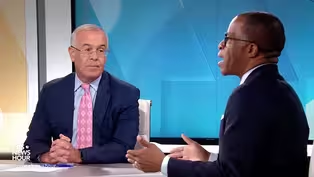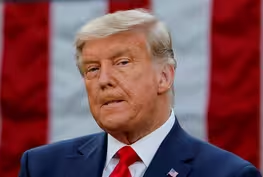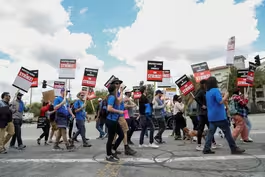
Lessons learned from COVID prepare world for future threats
Clip: 8/4/2023 | 7m 45sVideo has Closed Captions
How lessons learned from COVID are preparing the world for future health threats
The State Department is putting lessons learned during the COVID-19 pandemic into action. The Bureau of Global Health Security and Diplomacy is aimed at better preventing, detecting and responding to existing and future health threats. Its first leader is renowned virologist Dr. John Nkengasong. He sat down with Geoff Bennett to discuss the new effort to respond to global health crises.
Problems playing video? | Closed Captioning Feedback
Problems playing video? | Closed Captioning Feedback
Major corporate funding for the PBS News Hour is provided by BDO, BNSF, Consumer Cellular, American Cruise Lines, and Raymond James. Funding for the PBS NewsHour Weekend is provided by...

Lessons learned from COVID prepare world for future threats
Clip: 8/4/2023 | 7m 45sVideo has Closed Captions
The State Department is putting lessons learned during the COVID-19 pandemic into action. The Bureau of Global Health Security and Diplomacy is aimed at better preventing, detecting and responding to existing and future health threats. Its first leader is renowned virologist Dr. John Nkengasong. He sat down with Geoff Bennett to discuss the new effort to respond to global health crises.
Problems playing video? | Closed Captioning Feedback
How to Watch PBS News Hour
PBS News Hour is available to stream on pbs.org and the free PBS App, available on iPhone, Apple TV, Android TV, Android smartphones, Amazon Fire TV, Amazon Fire Tablet, Roku, Samsung Smart TV, and Vizio.
Providing Support for PBS.org
Learn Moreabout PBS online sponsorshipGEOFF BENNETT: The U.S. State Department this week launched a new effort to respond to global health crises and put lessons learned during the COVID-19 pandemic into action.
The Bureau of Global Health Security and Diplomacy is aimed at better preventing, detecting and responding to existing and future health threats.
Its first leader is esteemed virologist Dr. John Nkengasong, ambassador at large for global health diplomacy, also the administration's global AIDS coordinator.
I spoke with him earlier this week about his new role.
Welcome to the "NewsHour."
DR. JOHN NKENGASONG, U.S.
Global AIDS Coordinator: Thank you.
GEOFF BENNETT: So, in creating this new bureau, the State Department hopes to elevate the issue of global health in U.S. international policy.
How?
How will this new bureau empower public health experts and diplomats to work more efficiently and more effectively?
DR. JOHN NKENGASONG: No, thank you.
The new bureau was launched today, as you rightly stated, by Secretary Blinken.
Let me start off by saying that this is a historic moment in our efforts to respond to global health threats, which we all learned from the COVID-19 pandemic that a threat anywhere in the world is a threat everywhere in the world.
There are three things that the bureau, we strive to do.
One is to elevate and lead with the United States' diplomacy, so that countries can work together in a coordinated, collaborative fashion to address any disease threat.
Secondly is to elevate health security as part of our foreign policy.
We have seen how devastating a disease that in 2019 was unknown in three short years killed 20 million people, disrupted economies in a way that was unimaginable and cost trillions and trillions of dollars.
And, lastly, truly to coordinate our own efforts domestically, because we know that the United States is a global leader in the field of global health.
But those assets, if coordinated appropriately, in collaboration with partner countries, can actually be a tremendous tool in responding to disease outbreaks.
GEOFF BENNETT: Drawing on your experience leading the agency that responded to public health crises across the continent of Africa known as Africa CDC, you confronted the early days of the Ebola crisis, the HIV/AIDS crisis, the COVID-19 crisis across the continent.
What lessons did you learn in that experience that you hope to apply to your new role?
DR. JOHN NKENGASONG: The number one lesson that I learned during my stay at the Africa Centers for Disease Control and Prevention, as the pioneering director, was that international cooperation matters, because when disease emerge, they move very quickly.
I will give you an example.
When COVID-19 was first recognized in Wuhan, it took only 20 days for 66 countries in the world to be affected, 20 days, 66 countries affected.
It took only three years for 20 million people to die from that pandemic.
Now, the Africa CDC's role was to work at political level with the head of states, work at policy levels, work at technical level, and bring the whole continent together to cooperate and collaborate and coordinate their efforts as much as possible.
That is lesson number one.
When I made my remarks today at the launch of the bureau, I said, we need to lead with four C's, the ability to cooperate, collaborate, coordinate, and communicate.
The centrality for us to better respond to disease outbreaks and threats is to follow the leads with those four C's.
GEOFF BENNETT: The launch of this new bureau comes at a time when funding could be imperiled for another critical U.S. global health imperative known as PEPFAR, the President's Emergency Plan for AIDS Relief, established under former President George W. Bush back in 2003.
Right now, for the first time in the program's history, there are Republicans who are threatening the reauthorization because they say that PEPFAR is a vehicle for promoting abortion access, which is not true.
It's objectively not true.
That's prohibited by law.
But, still, this program has been caught up in the cultural wars.
How do you see that?
How do you respond to that?
DR. JOHN NKENGASONG: First of all, I always like to lift the mirror and look at where we're coming from 20 years ago, the desperate phase of HIV/AIDS in the world.
We saw in Africa, many countries in Africa, that the coffin market was thriving.
We saw in -- hospitals after hospitals were full of people, human beings that were skeleton with a thin skin over their bodies.
Because of the United States' moral leadership and values, we stepped in, and it became a defining moment.
We changed the narrative.
We changed the ugly face of HIV/AIDS.
And, today, 25 million lives have been saved; 5.5 million children have been born free of HIV/AIDS thanks to the commitment of the American people through the PEPFAR program, the U.S. President's Emergency Plan for AIDS Relief.
Our goal is to bring HIV/AIDS to an end by the year 2030 as a public health threat.
And it is very feasible.
This is not the time for us to relent on our leadership that the world has recognized, praised, and it reflects our values.
This is not the time for us to step back from those remarkable gains, which are very fragile.
So I remain optimistic that the bipartisanship that characterized PEPFAR and has done so for 20 years will prevail, and PEPFAR will continue to be reauthorized for five years.
GEOFF BENNETT: What's the key to that?
I mean, what's the key to sustaining those gains and then convincing political leadership that the fight against HIV/AIDS across the globe is not over and that the U.S. and the world, in fact, need to be prepared for the next outbreak?
DR. JOHN NKENGASONG: Absolutely.
First of all, we have to recognize that, thanks to our efforts through PEPFAR, about 20 million people in Africa are currently receiving lifesaving treatment.
However, they have to receive those treatment every day.
If you stop taking that treatment after a few weeks, the virus comes back.
It becomes a threat to the individual, which means the 20 million people would subsequently die.
It becomes a threat to the community, because they will transmit the virus.
And the systems, the infrastructure that we put in place through PEPFAR, is helping those partner countries, but it's helping us and protecting us, because, each time there's a disease outbreak out there, the PEPFAR infrastructure that we put in place is used frequently and often and immediately in responding to those disease threats so that they do not become a threat here in the United States.
So, I think it's a critical moment that we finish the fight and we do not get complacent.
GEOFF BENNETT: Dr. John Nkengasong is the new head of the Bureau of Global Health Security and Diplomacy.
It's great to have you here, sir.
Few people have done as much to confront global health crises around the globe as you have.
So it's a real privilege to speak with you.
DR. JOHN NKENGASONG: Thank you.
Thank you so much.
Brooks and Capehart on Trump's latest indictment
Video has Closed Captions
Clip: 8/4/2023 | 10m 10s | Brooks and Capehart on Trump's latest indictment and climate politics (10m 10s)
GOP candidates avoid climate change on campaign trail
Video has Closed Captions
Clip: 8/4/2023 | 7m 15s | GOP presidential candidates avoid discussing climate change on campaign trail (7m 15s)
Job report falls short but shows recession might be avoided
Video has Closed Captions
Clip: 8/4/2023 | 4m 20s | Jobs report falls short of expectations but signals recession might be avoided (4m 20s)
News Wrap: Trump enters plea on new charges in document case
Video has Closed Captions
Clip: 8/4/2023 | 4m 41s | News Wrap: Trump enters plea on additional charges in classified documents case (4m 41s)
Studios, writers return to negotiations after 3 months
Video has Closed Captions
Clip: 8/4/2023 | 6m 34s | Studios and writers return to contract negotiations for first time in 3 months (6m 34s)
U.S. company Haas appears to supply Russian arms industry
Video has Closed Captions
Clip: 8/4/2023 | 10m 2s | U.S. company Haas appears to still indirectly supply Russian arms industry with technology (10m 2s)
Providing Support for PBS.org
Learn Moreabout PBS online sponsorship
- News and Public Affairs

FRONTLINE is investigative journalism that questions, explains and changes our world.

- News and Public Affairs

Amanpour and Company features conversations with leaders and decision makers.












Support for PBS provided by:
Major corporate funding for the PBS News Hour is provided by BDO, BNSF, Consumer Cellular, American Cruise Lines, and Raymond James. Funding for the PBS NewsHour Weekend is provided by...





